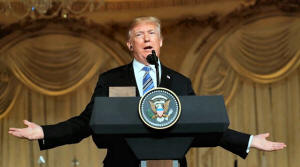|
Trump hopes for successful North Korea
summit, but warns he could walk away
 Send a link to a friend
Send a link to a friend
 [April 19, 2018]
By Steve Holland [April 19, 2018]
By Steve Holland
PALM BEACH, Fla. (Reuters) - U.S. President
Donald Trump said on Wednesday he hoped an unprecedented summit with
North Korean leader Kim Jong Un would be successful after a recent visit
to Pyongyang by CIA Director Mike Pompeo, but warned he would call it
off if he did not think it would produce results.
Trump told a joint news conference with Japanese Prime Minister Shinzo
Abe that his campaign of "maximum pressure" on North Korea would
continue until Pyongyang gave up its nuclear weapons.
He also said Washington was negotiating for the release of three
Americans held by North Korea and there was "a good chance of doing it."
He did not answer a reporter's question as to whether that would be a
condition for going ahead with the summit.
“I hope to have a very successful meeting (with Kim),” Trump said in
Palm Beach, Florida.
“If I think that it’s a meeting that is not going to be fruitful, we’re
not going to go," he added. If the meeting when I’m there is not
fruitful, I will respectfully leave the meeting.”

Trump said earlier that Pompeo, one of his most trusted advisers and his
pick to be the next U.S. secretary of state, formed a "good
relationship" with Kim when he became the first U.S. official known to
have met the North Korean leader.
U.S. officials said Pompeo met Kim when he visited Pyongyang over the
Easter weekend, which ran from March 31 to April 2, to lay the
groundwork for the planned summit, in which Trump hopes to persuade
North Korea to abandon development of nuclear missiles capable of
hitting the United States.
"Mike Pompeo met with Kim Jong Un in North Korea," Trump tweeted
earlier. "Meeting went very smoothly and a good relationship was formed.
Details of Summit are being worked out now. Denuclearization will be a
great thing for World, but also for North Korea!"
A senior administration official said Pompeo brought up the case of the
three American prisoners with Kim in North Korea and that the United
States was hopeful for their release.
GOODWILL
Pompeo's visit provided the strongest sign yet of Trump's willingness to
become the first serving U.S. president to meet a North Korean leader.
Trump said on Tuesday he believed there was a lot of goodwill in the
diplomatic push, which he has said could take place in late May or early
June.
U.S. officials said the visit by Pompeo was arranged by South Korean
intelligence chief Suh Hoon with his North Korean counterpart, Kim Yong
Chol, and was intended to assess whether Kim was prepared to hold
serious talks about giving up his nuclear weapons.

They said Pompeo's conversations in Pyongyang fueled Trump’s belief that
productive negotiations were possible, but far from guaranteed. They
said no site had yet been chosen for a summit.
Pompeo flew to North Korea from a U.S. Air Force base in Osan, south of
Seoul, an official with South Korea's Defense Ministry said.
Pompeo told his Senate confirmation hearing last week for secretary of
state that he was optimistic a course could be set at a Trump-Kim summit
for a diplomatic outcome with North Korea, but added that no one was
under any illusion that a comprehensive deal could be reached at that
meeting.
Pompeo said the aim would be “an agreement ... such that the North
Korean leadership will step away from its efforts to hold America at
risk with nuclear weapons” and that Pyongyang should not expect rewards
until it takes irreversible steps.
[to top of second column]
|

President Donald Trump speaks during a joint news conference with
Japan's Prime Minister Shinzo Abe at Trump's Mar-a-Lago estate in
Palm Beach, Florida, U.S., April 18, 2018. REUTERS/Kevin Lamarque

NORTH-SOUTH SUMMIT
News of Pompeo's trip came as South Korean President Moon Jae-in was
preparing for his own summit with Kim, on April 27, with a bid to
formally end the 1950-1953 Korean War a major factor.
"As one of the plans, we are looking at a possibility of shifting
the Korean Peninsula's armistice to a peace regime," a top South
Korean presidential official told reporters in Seoul.
"But that's not a matter than can be resolved between the two Koreas
alone. It requires close consultations with other concerned nations,
as well as North Korea."
South Korea and a U.S.-led U.N. force have remained technically at
war with North Korea since the Korean War ended with a truce, not a
peace treaty. The U.S.-led United Nations Command, Chinese forces
and North Korea signed the 1953 armistice, to which South Korea is
not a party.
The South Korean official said he did not know if any joint summit
statement would include wording about ending the war, "but we
certainly hope to be able to include an agreement to end hostile
acts between the South and North."
Trump said on Tuesday he backed efforts between North and South
Korea aimed at ending the state of war.

Such discussions between the two Koreas, and between North Korea and
the United States, would have been unthinkable last year when North
Korea conducted repeated missile tests, detonated its largest-ever
nuclear bomb, and said the United States was now within range of its
weapons.
The tests and escalating rhetoric between Trump and Kim raised fears
of war before the North Korean leader called, in a New Year's
speech, for lower military tensions and improved ties with South
Korea.
Amid the diplomatic flurry, CNN reported that Chinese President Xi
Jinping planned to visit Pyongyang soon, after Kim made a surprise
trip last month to China, Pyongyang's sole major ally.
Despite China's traditional friendship with North Korea, Beijing has
been angered by Kim's weapons development and backed successive
rounds of U.N. economic sanctions, from which Pyongyang is seeking
respite.On Wednesday, finance ministers from the Group of Seven
industrialized countries issued a statement saying they were
concerned about North Korea's evasion of sanctions and its "ability
to access the international financial system."
(Reporting by Steve Holland in Palm Beach, Fla.; Additional
reporting by Josh Smith, Soyoung Kim and Joyce Lee in Seoul, Makini
Brice, Susan Heavey, John Walcott, Matt Spetalnick, David Brunnstrom
and Doina Chiacu in Washington and Christian Shepherd in Beijing;
Editing by Alistair Bell and Peter Cooney)
[© 2018 Thomson Reuters. All rights
reserved.]
Copyright 2018 Reuters. All rights reserved. This material may not be published,
broadcast, rewritten or redistributed.
Thompson Reuters is solely responsible for this content.
 |